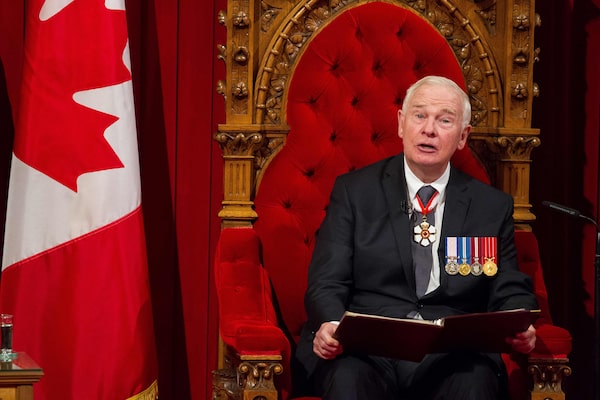
Canadian Prime Minister Justin Trudeau tapped David Johnston, former governor general, to look into the evidence of Chinese election interference.GEOFF ROBINS/AFP/Getty Images
David Johnston is an inspired choice for special rapporteur investigating Chinese interference in Canadian elections. If he is wise, Conservative Leader Pierre Poilievre will accept that choice. Because to criticize Mr. Johnston would be the same as criticizing Stephen Harper.
The former prime minister selected Mr. Johnston to be Canada’s 28th governor-general in 2010. Mr. Harper asked Mr. Johnston to stay on in 2015.
At the time, it looked as though Canada might have a hung Parliament after the autumn general election. Mr. Harper wanted a trusted and seasoned governor-general to handle any difficulties that might arise. Out of a sense of duty, Mr. Johnston agreed.
Now he has been asked to take on a new duty, and a heavy one it is. The key question is whether Mr. Johnston, after examining all the evidence, much of it secret, will advocate for a public inquiry into Chinese election interference or propose other measures to protect the integrity of the next Canadian election.
Whatever he decides, Canadians of goodwill should accept that decision. There are few, if any, figures in Canadian life whose word can be more trusted.
Mr. Johnston arrived at Rideau Hall after a tempestuous period. His predecessor, Michaëlle Jean, had faced a constitutional crisis, when Mr. Harper asked her to prorogue Parliament to avoid a vote of non-confidence. Ms. Jean chose wisely in granting prorogation. But it reminded Canadians that the governor-general’s role, while mostly ceremonial, can become pivotal in times of crisis.
Mr. Johnston came to the job of governor-general superbly qualified: He was first a legal scholar, then dean of law at the University of Western Ontario, then principal of McGill University, and then president of the University of Waterloo.
In his years as GG, he displayed discretion, good humour and sound judgment, qualities that will be required in this new role, at a time of deep public unease over foreign interference in our elections.
The Trudeau government has responded with secrecy and obfuscation to reports in The Globe and Mail and Global News that the Chinese government sought to influence the 2019 and 2021 elections, allegedly to help certain Liberal MPs get elected.
Mr. Trudeau agreed to appoint a special rapporteur only after it became clear that the public demanded a response.
Polls show that most Canadians would like to see a stronger response from the federal government over Chinese election interference. Opposition party leaders are calling for one. Mr. Johnston’s job is to look at all the evidence, including materials before two parliamentary committees, and recommend a course of action.
Mr. Poilievre has, in the past, not hesitated to shoot the messenger when he didn’t like the message. He dismissed the report of Justice Paul Rouleau that concluded the Liberal government was justified in invoking the Emergencies Act to deal with protests and blockades last year.
Mr. Poilievre dismissed that conclusion using an ad hominem argument that Justice Rouleau had ties to the Liberal Party. There is nothing in the report that this writer can discern to suggest Justice Rouleau exhibited any kind of bias or political partisanship.
The Conservative Leader has previously dismissed Mr. Trudeau’s promise to appoint a rapporteur, “which of course will be another establishment Liberal appointed by him who will say everything is fine, let’s just close the book, move on, and let the dictatorship in Beijing once again interfere to help Justin Trudeau get re-elected.”
But it’s a pretty safe bet that Mr. Harper would not have appointed Mr. Johnston if he considered him to be “another establishment Liberal.” And if Mr. Poilievre dismisses Mr. Johnston in those terms this time, he will anger some very senior members of the previous Conservative government.
That may not stop him. As my colleague Andrew Coyne tweeted, Mr. Johnston recommended the terms of reference for the Oliphant inquiry into dealings between the businessman Karlheinz Schreiber and former prime minister Brian Mulroney. Those terms of reference were strongly criticized. And it will not help that Mr. Johnston is a member of the Pierre Elliott Trudeau Foundation.
Poilievre adviser Jenni Byrne tweeted criticism of Mr. Johnston’s performance as head of the electoral debates commission.
But the question is simply this: Should Canadians trust the judgment of the person appointed by the Trudeau government to look into the evidence of Chinese election interference? I cannot think of anyone whose judgment I would trust more.
 John Ibbitson
John Ibbitson